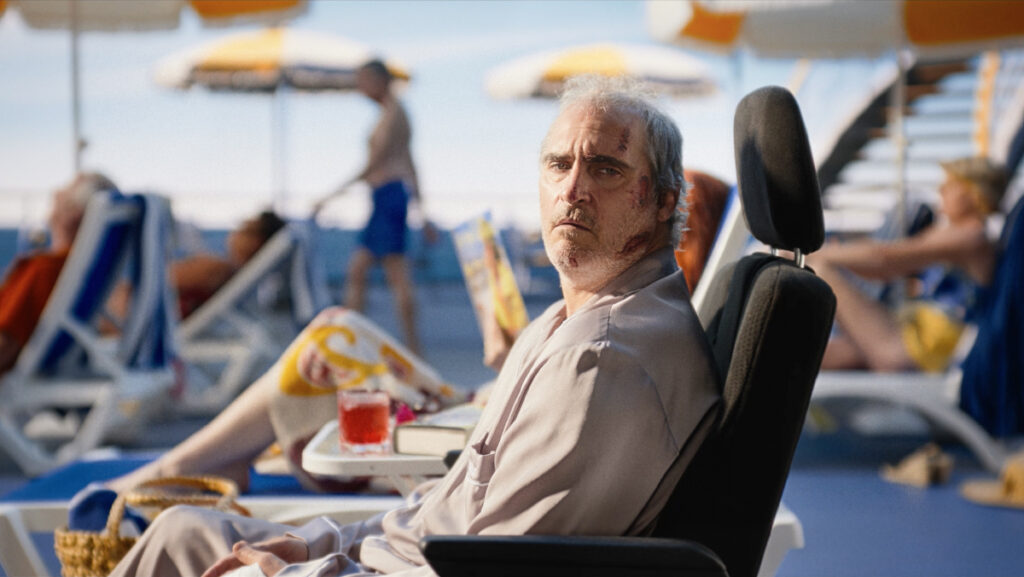With “Hereditary” and “Midsommar” alone, director Ari Aster made a name for himself as a confident new voice to watch in the horror genre. With his third film, Aster proves that he is able to transcend the conventions of any genre in order to tell a unique and disturbing story that bends audience’s expectations to his will. Perhaps most importantly, he is not afraid to ruin “Always Be My Baby” by Mariah Carey in the process.
“Beau is Afraid” follows the timid and frightened Beau (Joaquin Phoenix) on a life-altering trip to visit his mother (Patti LuPone). A series of obstacles come in Beau’s way at just about every turn, forcing him to confront his deepest anxieties and examine his troublesome relationship with his mother — plagued by mommy issues right from the start. Beau finds himself walking through a mystical forest of performers and an unusual family that takes him under their wing. But the exact details of where Beau finds himself are difficult to explain and even more confusing in the act of watching this wild trip of a film. Be warned.
Aster is known for his frightening imagery, blood-splattering decapitation shots and bizarre folk stories about cults, families and generational trauma. In “Hereditary,” it’s all about the inescapable traits that people inherit from their parents. “Midsommar” tackles a toxic relationship and how a cult manages to take advantage of somebody at their mentally lowest point. “Beau is Afraid,” Aster’s most ambitious project yet, shares many similarities with his previous work, with the added element of dark comedy and situational humor found in the most unexpected places.
This is especially prevalent in the first act when the audience gets introduced to Beau in his run-down apartment. He is surrounded by a mob of violent people — including a naked man called Birthday Boy Stab Man — who are always waiting to pounce on Beau at any given moment. Right away, Aster taps into Beau’s crisis-focused mindset, putting the viewer on edge without losing sight of how ridiculous certain situations in the world Aster has created seem. Aster’s decision to maintain a wicked sense of humor, even in particularly dire situations when Beau’s life is at risk, only creates more sympathy for Beau as a character.
Phoenix in the lead role holds the whole thing together with his complete commitment to Beau, who audiences find themselves rooting for the entire time. Things just cannot seem to stop going wrong for the poor guy, but not to the point where he loses agency — and the audience — entirely.
As is often unfortunately true with many auteur filmmakers who take control of nearly every creative aspect of the film, Aster cannot help but get in his own way at times. While there is plenty of cinematic meat in the film’s three-hour runtime, it is hard to justify each and every minute.
This problem is evident at the beginning of the film’s second act after a sudden cut to black when Beau wakes up in the home of Grace (Amy Ryan) and Roger (Nathan Lane). He begins getting mentally tormented by their teenage daughter Toni (Kylie Rogers) and cannot seem to find a way out to see his mom. The frantic energy that starts off “Beau is Afraid” is quickly and painfully slowed to a halt in this confusing extended sequence that feels like it belongs in a different film. Once Beau physically resumes his journey that resembles an epic quest like Homer’s “The Odyssey,” the film rebuilds its momentum that culminates in an excellent final reveal, recontextualizing everything that came before.
In the third act, Aster perhaps over-explains the message of the film a bit, but it is also satisfying to witness how the relationship between Beau and his mother is resolved. This section of the film is LuPone’s time to shine, as she brilliantly chews the scenery and complicates the plot in unexpected ways. Although it takes too long to get to this point, the last thirty minutes of “Beau is Afraid” represent some of Aster’s finest filmmaking to date.
No matter where Aster’s career goes next, it will certainly be a must-watch. It is inevitable that “Beau is Afraid” is going to lose him some fans, but the kind of filmmaker that’s willing to take those kinds of risks should be celebrated.





















